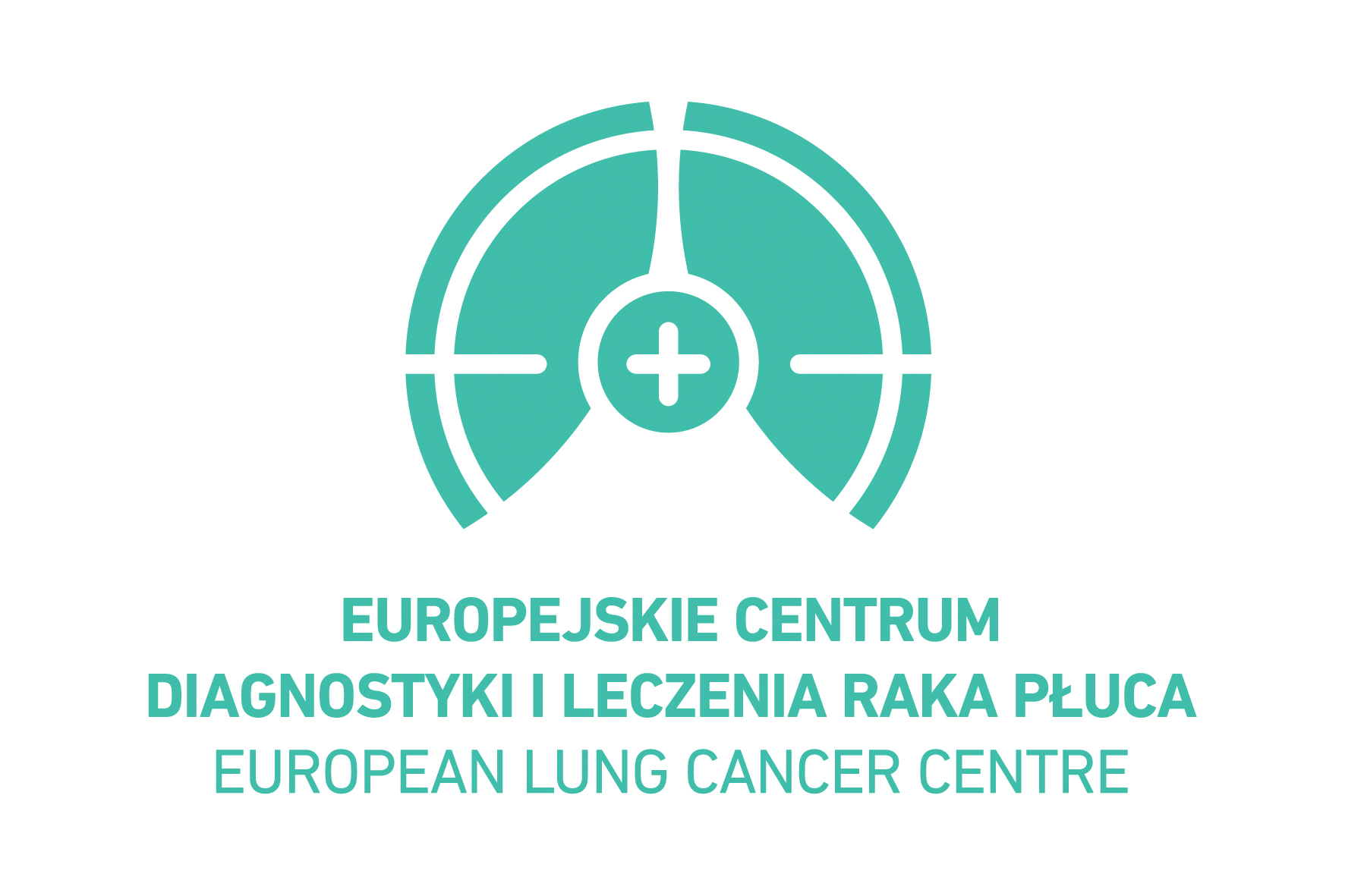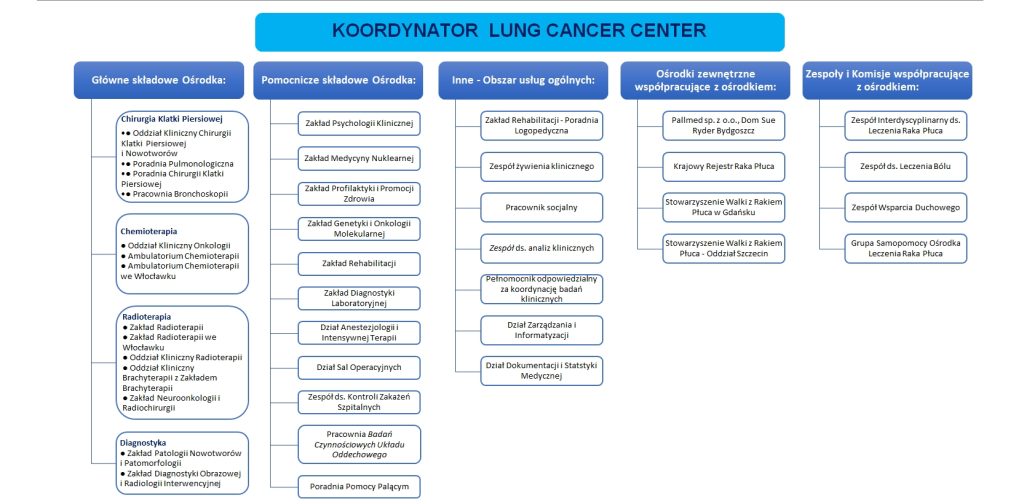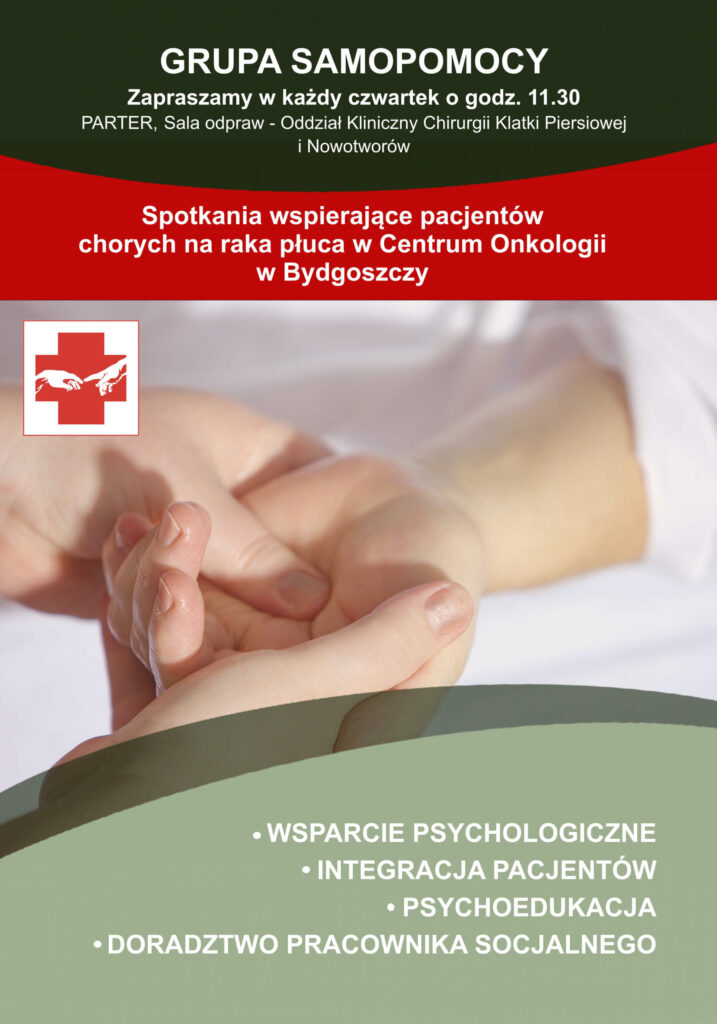Lung Cancer Diagnostic and Treatment Center (LCC)

Oncology in Bydgoszcz at the European level
For several years, the Oncology Centre in Bydgoszcz has been in the top positions of the national rankings of the best hospitals. This is due to constant investments in the hospital infrastructure, state-of-the-art equipment for diagnosis and treatment of cancer patients. This hospital was the first and for over 10 years the only one to install a positron emission computed tomography device, commonly known as PET/CT. The hospital provides comprehensive diagnostic options, ranging from traditional and modern imaging tests, through radioisotope and endoscopic examinations, to very innovative genetic and molecular tests. Modern surgical treatment, especially with the use of minimally invasive techniques, as well as chemotherapy and radiotherapy, do not differ from those used in highly developed countries of the European Union.
Even better quality
What more can be done to further improve the quality of the medical services provided and to make our patients even safer? The efforts of the Hospital Board and the management of individual organizational units are currently focused on the preparation of the rules for the functioning of a modern multidisciplinary organ centre for the diagnosis and treatment of lung cancer – Lung Cancer Centre Bydgoszcz. The centre will soon become certified.
Malignant lung cancer is killing more and more men and women
Poland is one of the countries with very high morbidity and mortality from lung cancer. This neoplasm is currently the most frequently diagnosed malignant neoplasm in men and the second most common neoplasm in women. In both sexes, one-year and five-years survival periods are among the shortest in Europe. Recently, among women, the number of deaths from lung cancer has exceeded that from breast cancer, and lung cancer is therefore the leading cause of death from cancer. Fast, efficient, professional and modern diagnostics as well as aggressive and targeted treatment of this cancer can contribute to the success in the fight against this dangerous disease.
Comprehensive centre for the diagnosis and treatment of lung cancer
So far, the diagnosis and treatment of lung cancer at the Oncology Centre in Bydgoszcz included all the necessary elements, however, operating independently of one another. Such organization of work resulted in prolonged diagnostics and inconsistent in many ways treatment. A few years ago, joint substantive multidisciplinary committees were introduced at the Oncology Centre in Bydgoszcz to accelerate therapeutic decisions and to resolve doubts and personalize treatment. Modern genetic tests were introduced to qualify for immunotherapy and targeted treatment. For patients qualified for radical surgery or radical radiotherapy, a PET/CT examination is unconditionally performed, which allows to avoid inadvisable surgery in the presence of metastases to other organs. Constant and successive training of the surgeons in leading European and world hospital centres with enormous surgical experience (Ljubljana, A Coruña, Shanghai) allowed for the introduction of new minimally invasive surgical techniques for lung cancer treatment, such as excision of a segment or lobe of the lung with access through a 4-5 cm opening in the chest. The hospital cooperates with leading European surgeons, the creators of this technique, which resulted in their arrival in Bydgoszcz and training of our staff in the conditions of our surgical ward. Currently, almost 80% of radical lung cancer surgeries are performed at the Oncology Centre with the use of this method. Modern stereotaxic radiotherapy, which has been used for several years, allows the destruction of cancer while sparing the healthy parenchyma of the lung in patients not qualified for surgery.
Since mid-2018, lung cancer diagnostics and treatment have been organized in a comprehensive and multidisciplinary manner, using the equipment, premises and human resources of one centre – the Oncology Centre in Bydgoszcz. The system used in the European Union countries for the certification of such centres was used to organize this activity. The author of the requirements and the certification centre is the German Cancer Society in cooperation with the German Society for Thoracic Surgery and the German Respiratory Society.
The adaptation of Polish conditions to the requirements of the Lung Cancer Centre certification resulted in many organizational changes, the purchase of additional equipment and the employment of new employees involved in the implementation of the centre’s tasks and providing patients with additional comfort and professional medical, social and psycho-oncological care.

Struktura organizacyjna LUNG CANCER CENTRE BYDGOSZCZ
Access to outpatient counselling was increased by opening an additional pulmonary outpatient clinic for patients with suspected lung cancer. As part of the functioning of the Department of thoracic surgery, pulmonology specialists were employed, who cooperate in minimally invasive and endoscopic diagnostics of lung lesions. A group of pulmonologists examine the respiratory parameters of candidates for surgical treatment, cooperate in the preparation of the patient for surgery, and care for the patient in the postoperative course. The purchased modern equipment for comprehensive examinations of the respiratory system efficiency contributes to the correct qualification of patients to specific forms of treatment. Psycho-oncological and diet counselling has been intensified and formally regulated. The position of a social worker was introduced, whose task is comprehensive legal and organizational assistance regarding the functioning in new conditions of disease treatment.
The possibilities of using preoperative, but also postoperative inpatient and outpatient pulmonary rehabilitation were developed. Principles of performing diagnostic imaging and histopathological examinations have been developed, with short deadlines for their performance and obtaining results. Specialized equipment for endoscopic diagnostics was purchased, organizing one of the best equipped bronchoscopic laboratories in Poland.
The composition of multidisciplinary medical case committees was extended and their frequency intensified. Currently, case committees are held three times a week. In addition to a surgeon, chemotherapist and radiotherapist, the committee now includes: a pulmonologist, radiologist, pathologist and the social worker. Patient advisers watch over the course of the case committees. In addition to qualifying for specific types of treatment, the case committee determines the date and place of its conduct. The case committees examine patients both during the qualification for treatment and after the completion of its individual stages. The case committee decides on adjuvant treatment (chemotherapy or radiotherapy) after surgery and further local treatment after induction chemotherapy.
The hospital organizes an extensive information campaign on the principles of the centre’s operation for both family doctors and pulmonologists. A media information campaign raising the severity of the problem of lung cancer and smoking as the main cause of this cancer is conducted among patients and residents of the voivodeship. The hospital cooperates with centres helping to quit smoking and with the organization of patients cured of lung cancer called “Lung Cancer Association”.
The level of satisfaction of both the doctors referring to the Oncology Centre and the patients of this clinic is systematically checked in periodic questionnaires. All comments and accurate observations help to improve the current organization of the centre.


